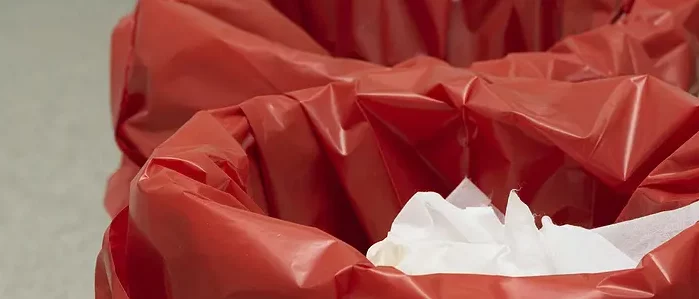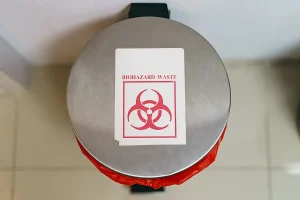Disposing of Blood Waste at Home

A need for blood disposal at home can be created in innumerable ways. Which of them requires professionals to dispose of the blood? Can’t you throw blood-infected material in the garbage? Are there regulations regarding residential blood disposal? The following information guidelines may help you know what mandates professional help and what can be a personal decision about handling blood disposal in the home.
Your son comes in after falling off his bicycle with a scraped and bloody elbow. You periodically replace the band-aid. A handyman cuts his finger with a knife and drips blood on your floor. The police shoot an armed intruder in your house, and you have blood all over the place. Anyone could add to the list when blood could be an issue in the home.
Understanding How Dangerous Blood Waste Can Be
Blood is a bodily fluid assumed to be infectious. Some pathogens that infect blood can live outside the body for months, and some pathogens can be spread and infect a person with a minuscule amount.
Moreover, all blood waste, in all cases, can be deadly. In some cases, those pathogens will make a person sick but can recover after treatment. In other cases, they will die.
Is Blood Waste Disposal Regulated?

Residential blood waste and healthcare facility blood waste do not differ in quantity or types of pathogens. While some evidence suggests you can safely dispose of blood waste in municipal waste landfills, there are still significant dangers of improper disposal. This can specifically pose danger to nurses, janitors, and landfill employees.
Unfortunately, federal regulations don’t address blood disposal in the home as strictly as healthcare waste. OSHA has one rule that may apply to household waste. It says the bloodborne pathogens standard defines regulated waste as a liquid or semi-liquid blood, contaminated items that would release blood in a liquid or semi-liquid state if compressed, items that are caked with dried blood and are capable of releasing these materials during handling; and contaminated sharps.
Otherwise, state and local regulations, if they exist, define procedures for handling residential waste. It is the residents’ responsibility to know what and if regulations apply. A local Board of Health is an excellent place to start inquiries.
Examples of Blood Waste Items
You can toss blood waste from band-aids, minor wounds you treat with first aid, cotton swabs, etc., in the garbage. Conscientious disposal would include placing the material in a separate plastic bag and tying it off. Used gloves are also considered contaminated waste and should be included with the disposal.
The blood spill’s size and what it contaminates judges a spill due to a severe wound. Using proper Personal Protective Equipment, you can clean up a spill smaller than a plate on a solid surface. You should disinfect the affected area with bleach, and wash any cleaning cloths. In addition, dispose of the used gloves in the garbage.
Furthermore, larger spills or spills on drywall or carpets may require professional help. Proceed on the side of caution when dealing with blood.
Trauma injuries often cause blood splatter, sometimes in minuscule amounts unseen to the human eye. A crime scene that involves blood will require appropriately trained professionals. The pay-off is that clean-up teams ensure hospital-like sterilization of the area using ATP testing equipment.
Need Professional Help with Your Blood Waste Disposal?
If you care for a loved one at home who creates blood waste, have an accident that involves a significant amount of blood, or want to know how you can more conscientiously dispose of blood waste at home, we will provide you with the resources you need. We will connect you with local professionals who can help you dispose of your regulated medical waste. To start, give us a call at (888)-755-6370 or fill out the form to get a free quote.










